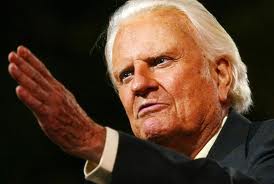50 leaders of the evangelical generation: #2 Billy Graham. The Godfather
[I am working on a project that may become a book on the most influential evangelicals leaders of our generation, since 1976, and the impact they’ve had on the church and their times. I will introduce them briefly on this blog from time to time. Who should be on this list?]
#2. Billy Graham. The Godfather b. 1918
Billy Graham has been the best known and most admired evangelical Christian in the world for decades. Through his early flamboyance, his clear and public Gospel preaching, his non-partisan access to the powerful, his move beyond fundamentalism, and his life of personal and ministry integrity, Billy Graham set the standard not only for evangelistic fidelity, but also as a figure admired all over the world, by believers and unbelievers alike.
While most would recognize Graham as the most visible and influential evangelical of the modern era, his shaping of the movement came primarily in the mid-20th century. Together with Carl Henry and Harold J. Ockenga, Billy Graham was a 1950’s bridge from fundamentalist separatism to evangelical engagement. Henry rallied evangelicals to engage politics, academia, and other cultural spheres with The Uneasy Conscience of Modern Fundamentalism in 1947. He delivered a stinging rebuke to fundamentalists who had withdrawn from these public arenas. Billy Graham delivered the decisive break between evangelicals and fundamentalists in 1957. Graham turned down invitations to preach in New York City under the sponsorship of fundamentalist churches before accepting one from the liberal Protestant Council. [1]
Graham’s actions were strategic, not careless:
“For years, Billy Graham was lambasted for inviting theological liberals — as well as people unpopular in the Evangelical South, like Martin Luther King, Jr. — to his crusades. He invariably responded that the attendees were endorsing his cause, not the other way around. Graham knew that he would alienate some co-believers, but they were people he was happy to alienate. He was in the business of leading evangelicalism back into the American mainstream by distinguishing it from hard-core fundamentalism, one of whose most irritating characteristics was “second-degree separation,” a philosophy of ostracizing other Christians simply for dealing with people considered less spiritually pure. Graham’s national reputation flourished while that of his opponents suffered.” [2]
To guard his personal life, Graham famously had a policy that he would never be alone with a woman, other than his wife Ruth. This has come to be known as the Billy Graham Rule. Rev. Rick Warren and NFL quarterback Kurt Warner have claimed to follow the rule. Warner wrote in his book that he first applied the Billy Graham Rule in his marriage by not driving the babysitter home alone.
Graham has been a spiritual adviser to twelve United States presidents, from Harry Truman to Barack Obama (some, such as Richard Nixon, more than others). He is number seven on Gallup’s list of admired people in the 20th century.[3] It is said that Graham has preached in person to more people around the world than any other preacher in history. As of 2008, Graham’s lifetime audience, including radio and television broadcasts, topped 2.2 billion. More than 2.5 million people have come forward at his crusades to accept Jesus Christ as their personal Savior.
Although Graham has had little involvement in activities beyond his own for many years, his early accomplishments, his commitment to the singular cause of evangelism, and his long life (he has outlived most of his contemporaries and his wife, Ruth) have made him the face of evangelicals for more than a generation. Although now retired and nearly immobilized by Parkinson’s disease and other ailments, he remains the iconic figure of the movement.
[1] http://www.theresurgence.com/blog/692
[2] TIME, Dec. 1, 2006
[3] http://www.pollingreport.com/20th.htm
Filed under: Christianity • Evangelical Leadership • Jim
Like this post? Subscribe to my RSS feed and get loads more!


Please take a look at Fr. Mike Scanlan, TOR, Chancellor of the Franciscan University of Steubenville, considered by many to the be leader in the Catholic Charismatic Renewal in the United States.
Thanks for this suggestion. I love Mike Scanlan and the Steubenville people. I visited there several times during the years that I traveled with Chuck Colson, who became a very good friend of Father Scanlan. I haven’t had much contact with him in recent years, though; so it was good to see his name again. (I’m one of few evangelicals you’ll know of who has a Francisan cross on his wall, which I purchased in the Steubenville gift shop!) Blessings.